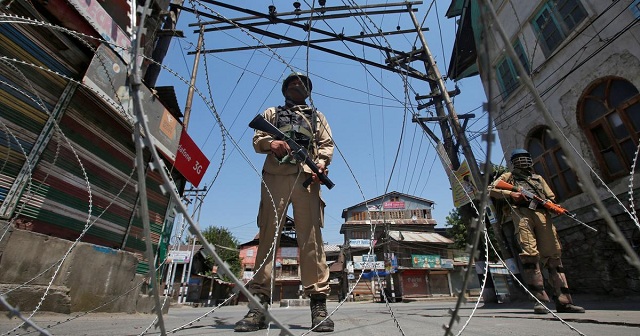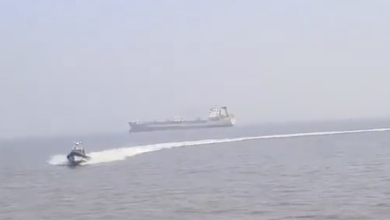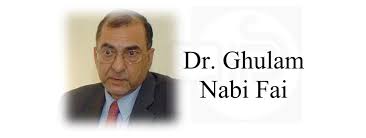Article: Empty rooms, silenced voices: What remains of Kashmiri civil society’s valiant fight for justice
 Freny Manecksha
Freny Manecksha
Not far from Ghanta Ghar in Srinagar, which has morphed into a site for tourists and Instagram selfies, is the Bund and the Amira Kadal bridge. Like the clock tower, both have historic connotations that stand at risk of makeovers and erasures in rapidly-changing Srinagar.
The Bund, a walkway, along the right bank of the Jhelum, was built in the early years of the 20th century, during Dogra rule, for the convenience of British tourists. The elegant buildings that flanked the walkway were constructed in a variety of styles, ranging from traditional architecture near the alleys of Abi Guzar to colonial-style buildings.
One notable building bearing testimony to Srinagar’s cosmopolitan heritage was owned by a Parsi family, the Pestonjis. It was well known for the white wooden horse that stood outside – the brand mark of a Scottish distillery. Though the building was gutted by fire in 1992, the wooden horse survived and was relocated to a shopping mall. But fortunately, the legendary Suffering Moses store, started in 1840 by the Wani family, still stands with its rooms containing exquisite collections of Kashmiri craftsmanship.
Amidst these splendid heritage structures is a building, believed to be over a hundred years old, known locally simply as “human rights walloh ka office”.
Standing almost at the very edge of the Bund, abutting the Amira Kadal, it is not fancy. But its walls are imprinted with history. It was in these rooms that Kashmir’s civil society was nurtured over the decades, doors were opened for all kinds of animated dialogue, debate and even confrontation – but always in a very respectful way.
Advocate Parvez Imroz, whose family owns the office, says the building was purchased by his grandfather from a wealthy Sikh family before 1947. For some years, a Pandit family used to run a hotel on the premises. The Jhelum View Hotel became the haunt of the Valley’s intelligentsia and socialists, reflecting the mood of Kashmir in the ’50s.
The building, recalled Imroz, later housed the office of the Kashmir Times founded by Ved Bhasin in 1954. The largest English circulating daily at that time, it was headed in Srinagar by bureau chief Zaffar Meraj. Mainstream politicians often came here to issue their press statements.
The building also housed the offices of trade unionist and human rights crusader Hriday Nath Wanchoo, who was organising sweepers and sanitation workers for their rights under the banner of the All India Trade Union Congress. He was shot dead by militants in 1992.
Imroz, who had his legal chambers in the building, said this practice of accommodating human rights advocates and citizens seeking justice under this one roof had begun expanding: in the conflict years, the entire premises were taken over for such endeavours. The bulk of Imroz’s work was to do with cases of disappeared people – or enforced disappearances, as this is technically known.
The Indian forces arrested and routinely detained men for interrogation. Many never returned home. Relatives, in anguish, began thronging the office. Habeas corpus pleas were filed to find out the fate of those missing. Human rights workers began to document and identify the perpetrators of this phenomenon. A conservative estimate puts the number of enforced disappearances since the beginning of the insurgency in 1989 at around 8,000 people.
In 1994, Imroz became one of the founders of the Association of Parents of Disappeared Persons. Another founder was Khurram Parvez who holds a Masters degree in mass communications and journalism from Kashmir University. In 2021, Khurram Parvez would be arrested by the National Intelligence Agency under Unlawful Activities Prevention Act and the Indian Penal Code. He has been accused of being part of a criminal conspiracy and raising funds for a terror act and is in jail in Delhi.
The Association of Parents of Disappeared Persons was formed as a collective to demand the truth: they wanted to know the whereabouts of the people who had disappeared and to campaign on the issue. Anyone whose family member had disappeared could join.
Over the years, the association was influenced by other associations concerned about disappeared persons. It started viewing disappearances beyond Kashmir’s own history; the struggle was placed in the context of the broader world order for justice. This international perspective was a keystone not just of the association’s functioning but also the Jammu Kashmir Coalition of Civil Society, founded in 2000 and of which it is a member.
In 1998, the Asian Federation Against Involuntary Disappearances was founded in Manila to address enforced disappearances across the continent. The offices of the Association of Parents of Disappeared Persons in Srinagar became the federation’s chapter of Kashmir. Parvez, who had received the Rebok human rights award in 2006, was elected chairperson of Asian Federation in 2014.
Gradually, victims of human rights violations other than disappearances also began thronging the office premises. The process of meticulously documenting these cases along with legal proceedings wherever possible gained momentum. Out of this came Informative Missives, a monthly dossier recording human rights violations.
Informative Missives continued its work until 2019, the year when Article 370 that gave Jammu and Kashmir special status under the Indian Constitution was abrogated. A devastating lockdown and communication siege was imposed.
The sheer numbers of people flocking the office and the crucial need to have independent spaces to discuss Kashmir was the impetus for the founding of the Jammu Kashmir Coalition of Civil Society. It was an amalgam of several non-funded, non-profit, campaign, research and advocacy organisations based in Srinagar.
Imroz explained the idea grew out of the vital need to nurture civil society as the main stakeholder in a region where spaces were controlled by politicians and political organisations. These came, he said, with their own history of compromises and limitations, particularly as Kashmir was caught in the tussle between India and Pakistan.
“The idea was to create spaces which were value based, particularly for the youth, where besides documenting rights violations one could also discuss ways for non-violent resolution of the conflict and one that would restrain extremism,” he said. “The aim was to foster transparency and put emphasis on the important role of civil society, even post conflict.”
Over the decades, a steady stream of people flowed through the rooms. There were Kashmiris from varied backgrounds, members of civil society from many parts of India, foreign correspondents and students interning from various universities. They were eager to gain experience in documentation from a civil society organisation of repute. In addition, diplomats, many of them Americans or Canadians, visited the office to try to glean insights.
In 2008, the ambassadors of four Scandinavian countries visited the office to voice their concern and demonstrate solidarity with Imroz after an attack on him at his home on June 30 that year, by Indian forces. This occurred after painstaking research had unearthed the presence of mass unknown graves in several parts of the state believed to contain the remains of enforced disappearances and unlawful killings. These had been documented by the Association of Parents of Disappeared Persons in a report on March 29, 2008.
In acknowledgment, the European Parliament passed a resolution in July 2008 calling on the Indian government to conduct an investigation into all suspected sites of mass graves. It condemned unlawful killings, enforced disappearances, torture, rape and other human rights violations in Jammu and Kashmir since the beginning of the armed conflict.
One lawyer recalled how an official from the Army’s Public Relation Office once came to the office to ask for a copy of a report. It was given to him.
The lawyer reminisced about how besides daily documentation conducted with rigour and energy, the office was also a buzzing hub for discussions on a wide range of issues – even social ones such as discrimination against homosexual people or transgender persons. Visitors were welcomed. They could be from varied religious, socio-cultural organisations, secular or otherwise. It did not matter. There would be dissenting views, often confrontation of ideas, but conversation was always respectful.
Questions about the role of the nation-state in changing times were debated. This was a forum where discussions about the future of Kashmir and the political aspirations of its people were not only taken up but were actually foregrounded.
Issues were not confined to Kashmir. Imroz recalled how Iranian students conducted a press conference on the premises in 1985, highlighting the repression by the theocratic government of Ayatollah Khomeini against Leftists and the Tudeh party.
The Jammu Kashmir Coalition of Civil Society contributed towards helping women articulate their concerns and amplified them. It offered valuable, safe, secure spaces and opportunities for women, especially the young. In a traditional society, where the conflict made some conversations difficult in public, it was the coalition’s office that enabled them.
Several women, eager to do their bit for Kashmir, became volunteers. They ventured out in the field. In the process, a perspective on gendered violence was honed and woven into the narratives and research.
One of those who contributed passionately and with great empathy for the struggle of women victims was Aasia Jeelani. Trained to be a journalist and having worked with the AFP news agency and a national daily, she joined the Association of Parents of Disappeared Persons in 2002. Initially, says Imroz, it was to gain experience for her curriculum vitae. But, she quickly became a staunch human rights defender, not hesitating to get her learnings from the field at a time when unmarried women did not venture out much.
Jeelani was killed on April 20, 2004, on a field trip to monitor elections when the Sumo taxi she was travelling in was blown up by a landmine in Kupwara district.
The driver, Ghulam Nabi Sheikh, died instantaneously while Jeelani and Parvez, who was also in the taxi, were both injured. Some other volunteers were also injured. Jeelani was put in a taxi bound for Srinagar but she died en route. Her body was lowered in a grave that evening in pouring rain.
In 2018, on the occasion of her death anniversary, Imroz showed me a poignant survivor of the most horrific events of the day, which he described as “the longest day of my life.”
It was an exercise book, pockmarked with the intensity of the blast, but the jottings clearly visible. Jeelani had scribbled how children in Sogum village had been proudly showing their fingers with voting marks, revealing how compromised the election was. Nevertheless, the elections would be showcased as an example of Indian democracy in the world’s most militarised region.
Parvez recounted to me the “utter devastation” of the day, in which he said they had lost “a colleague, one who had initiated the move for women to talk about the ongoing conflict”.
He himself received serious head and leg injuries and his leg was amputated subsequently. Despite this huge loss the coalition went ahead with the report on the elections.
When I began my research about gender in Kashmir in 2012, Parvez, told me how Jeelani’s interactions with women victims enabled her to understand the layers of suffering. It was double zulm (oppression), he explained, when there was violence by state and non-state agencies and then by imposition of social biases by patriarchal structures of society.
For over a decade, I, like so many researchers and journalists, navigated the rather steep stairs up to the office to meet with a variety of people and seek out such insights, context, statistics and detailed research to foreground my stories.
It was here in 2013 that I met with a young survivor of sexual violence. During our talk, a zalzala (earthquake) shook the room. It nearly threw me out of my chair, but the woman, with remarkable composure, continued with the chilling account of her experiences. Her alleged perpetrator was a highly decorated police officer. She added the office was the one place where she could speak out freely and was always accorded dignity and respect.
It was here on a summer’s day in 2017 that I interviewed Qalandar Khatana, a Gujjar shepherd from Kothiya village near the Line of Control, whose legs were amputated after he alleged he had been tortured by members of the Indian forces in the 1990s. Khatana’s image was carried as the frontispiece on the seminal report on torture by the Jammu Kashmir Coalition of Civil Society.
The report has been hailed by Juan E Mendez, former UN Special Rapporteur on Torture, as an “outstanding example” of how human rights organisations should monitor, investigate and report on human rights.
Khatana’s interview was also a poignant reflection on a fractured society. As a Gujjar, he was viewed with suspicion by the Indian forces, and by the rest of society as a possible mukhbir or informer. It resonated in my mind with the incident in Topa Mir, Rajouri in December, when the Gujjar community alleged killings and torture by the army. The army has ordered an investigation.
Another example of the deliberate splintering of Kashmiri society in conflict came in the mid-’90s with the rise of Ikhwanis. They were renegade militants and other Kashmiris deployed in counter-insurgency operations by the state. As Kashmiris, they used their knowledge of society to single out dissenters, human rights defenders, opposing parties and unleash terrible savagery on civilians.
Such outsourcing of violence, fragmented communities, created suspicion and distrust. Ikhwani commanders even stood for elections, practically setting up parallel states of governance, since they enjoyed total impunity.
When Rashid Billa, a dreaded Ikhwani, was shot dead by a mujahid in April 2017 whilst “absconding”, I sought the help of Irfan Mehraj, researcher and journalist associated with the Jammu Kashmir Coalition of Civil Society to do a report. Meraj helped me piece together the details of Billa’s life and his role in the Sadarkoot Bala massacre of October 5, 1996. Billa and three others had brutally killed four members of the family of National Conference worker Ghulam Qadir Dar and three other villagers.
In 2014, the relatives of the victims filed a writ petition seeking justice and it was the coalition that provided legal support. An accused Ikhwani, Wali Mohammad Mir, was arrested on May 9, 2019. The coalition in its press statement said it hoped the perpetrators would be brought to justice including “those Ikhwanis against whom FIRs are filed but who continue to roam freely”.
The demand for accountability, which forms the backbone of Jammu Kashmir Coalition of Civil Society reports and records, was to draw attention to the systemic violence being perpetrated on the Kashmiri people. It revealed in a sophisticated manner how all standards of human rights had been lowered in Jammu and Kashmir. This also extended to the agony of the Pandits.
When the Indian Supreme Court in August 2017 rejected a plea for a fresh probe into Pandit killings, the Jammu Kashmir Coalition of Civil Society in its statement said, that the order “is a complete departure from established law that crime never dies and there exists no time limitation for justice under Indian and international law with regard to serious crimes such as murder”.
Ironically, Meraj who had also worked on the torture report and one on the impact of violence on children of Jammu and Kashmir, was arrested on March 20, 2023, under the Unlawful Activities Prevention Act and a case was filed against him and Parvez.
The two arrests and the targeting of the very nature of the work of the Jammu Kashmir Coalition of Civil Society had a crippling effect. The office ceased functioning. Volunteers stayed away. Victims lost their support and have nowhere to go. Imroz keeps a lone vigil in the office amidst the posters and empty rooms. The stark silence speaks of how the very vital voices of Kashmir’s civil society have been muffled.
A stoic Imroz said, “We did what we could. Remember us.”
(The writer is the author of Behold, I Shine: Narratives of Kashmir’s Women and Children.)








